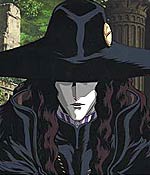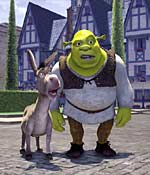
by Luis Reyes
Japanese animation, though under-funded relative to its American brethren, has had a profound impact on world animation, and yet it nearly slipped through the cracks this year when Urban Vision's Vampire Hunter D narrowly avoided disqualification for this year's Oscars. The field of feature-length animation enjoyed a boon this year when The Academy of Motion Picture Arts and Sciences included a Best Animated Feature Oscar to its litany of awards to be given out this spring at the 74th annual Academy Awards ceremony, which will be held in the brand spanking new Kodak Theater in the middle of a renovated Hollywood. "Talk of the award started five or six years ago when a committee of past presidents looking at the future of the awards mentioned it as a possible category," says John Pavlik, head of publicity for the Academy. "The governors that represent the short animated film award pushed for the feature animated film award. The only problem is that the committee didn't want to make it too easy and they didn't want to make it impossible to get a nomination. They settled on if there were eight to fourteen eligible submissions, the governors could select three nominees. If there were fifteen or more, then the governors could select five nominees." Last year the Academy didn't receive enough eligible submissions to make the category viable, but this year thirteen came in, out of which the Academy deemed nine eligible for nomination consideration in an announcement made in mid-December. Japanese animation, however, despite the sheer volume of feature-length animation pouring out of Japan every year, was nearly completely absent in the line-up. The frontrunners in the category were no surprise, Dreamworks' Shrek and Disney/Pixar's Monsters, Inc. top many favorites lists over the other big studio offerings, Sony's Final Fantasy: The Spirits Within, Paramount's Jimmy Neutron: Boy Genius, Warner Brother's Osmosis Jones, TriStar Pictures' The Trumpet and the Swan, and the modest but high profile Fox Searchlight's Waking Life (though Waking Life's conceptual innovation has certainly initiated some buzz on the artistically bankrupt streets of Tinseltown). Rounding out the category's nominee-eligible films were two low profile films, Tooniversal Co.'s Marco Polo: Return to Xanadu and M.R.I., Inc.'s Prince of Light.
The cloyingly family-oriented Marco Polo employs an animation style akin to some of the early Disney fairytales and follows the story of a young sailor, descended from Marco Polo himself, on a quest to reacquaint the two halves of a magical medallion while dishing out innocent overtures to a beautifully exotic princess. Tooniversal specializes in live-action and animated production work in the Czech and other Slovak Republics. The closest anime got to the nomination list was through Prince of Light, an Indian/Japanese co-production being distributed through Showcase Entertainment and based on one of the most famous Indian folk stories, Ramayana. Directed by Japanese filmmaker Yugo Sako and co-written by Sako and independent Indian filmmaker Krishna Shah, Prince of Light combines the anime style and the resplendence of Indian myth for a film that might very well give the rest of the category's features a run for their money. Originally, four films of the initial thirteen submissions didn't make the cut. "One film was released too early," Pavlik explains. "One didn't get a release in Los Angeles in time. One was withdrawn. And one neglected to fill out an official Screenwriter's Credit Form." |


